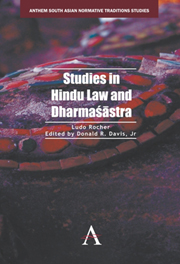Book contents
- Frontmatter
- Contents
- Foreword by Richard W. Lariviere
- Preface
- Abbreviations
- Note on the Edition
- Introduction
- PART ONE THE NATURE OF HINDU LAW
- PART TWO GENERAL TOPICS OF HINDU LAW
- PART THREE HINDU LEGAL PROCEDURE
- The Theory of Proof in Ancient Hindu Law
- The Problem of the Mixed Reply in Ancient Hindu Law
- The Reply in Hindu Legal Procedure: Mitra Miśra's Criticism of the Vyavahāra-Cintāmaṇi
- “Lawyers” in Classical Hindu Law
- Anumāna in the Bṛhaspatismṛti
- PART FOUR TECHNICAL STUDIES OF HINDU LAW
- PART FIVE ANGLO-HINDU AND CUSTOMARY LAW
- Bibliography
- Index
The Reply in Hindu Legal Procedure: Mitra Miśra's Criticism of the Vyavahāra-Cintāmaṇi
from PART THREE - HINDU LEGAL PROCEDURE
Published online by Cambridge University Press: 05 February 2013
- Frontmatter
- Contents
- Foreword by Richard W. Lariviere
- Preface
- Abbreviations
- Note on the Edition
- Introduction
- PART ONE THE NATURE OF HINDU LAW
- PART TWO GENERAL TOPICS OF HINDU LAW
- PART THREE HINDU LEGAL PROCEDURE
- The Theory of Proof in Ancient Hindu Law
- The Problem of the Mixed Reply in Ancient Hindu Law
- The Reply in Hindu Legal Procedure: Mitra Miśra's Criticism of the Vyavahāra-Cintāmaṇi
- “Lawyers” in Classical Hindu Law
- Anumāna in the Bṛhaspatismṛti
- PART FOUR TECHNICAL STUDIES OF HINDU LAW
- PART FIVE ANGLO-HINDU AND CUSTOMARY LAW
- Bibliography
- Index
Summary
The Vyavahāra-prakāśa (Vpra) of Mitra Miśra's Vīramitrodaya appears to be one of the largest digests on vyavahāra (judicial procedure). And not only is it one of the largest texts of its kind, but, through its numerous references to predecessors, it also serves as a most valuable source of information about earlier works on this subject, many of which have been lost in the course of time. One such work frequently referred to is Vācaspati Miśra's Vyavahāracintāmaṇi (Vyci). A complete list of these references will be found in the author's forthcoming edition of this text, together with the data to be derived from them with regard to the critical constitution of the text of both the Vyci and the Vpra.
The present paper is intended to discuss more extensively a limited number of Mitra Miśra's references to the work of Vācaspati. It is hoped not only to further a correct understanding of both texts, but also to provide a contribution to the history of Hindu legal procedure.
The treatment of the reply ranks among the most remarkable chapters of the Vyci. This fact must also have been recognized by Mitra Miśra when dealing with the same subject as he frequently refers to Vācaspati's point of view and, wherever necessary, refutes it at great length. In the following pages this controversy will be arranged under four headings corresponding to the four types of reply recognized by the authors of Dharmaśāstra:
1. Confession (saṃpratipattiḥ).
2. Reply by way of denial (mithyottaram).
3. Reply by way of exception (kāraṇottaram).
4. Reply by way of former judgment (prāṅnyāyaḥ).
- Type
- Chapter
- Information
- Studies in Hindu Law and Dharmasastra , pp. 405 - 416Publisher: Anthem PressPrint publication year: 2012



